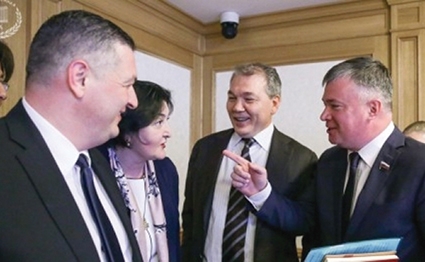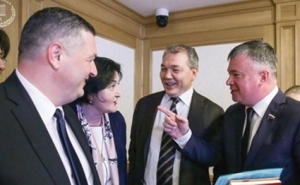Georgian MPs' Visit to Moscow Angers Georgians, Delights Russians
For the first time since the Georgia-Russia August 2008 war, three Georgian parliamentarians from the Russian-affiliated Alliance of Patriots of Georgia (APG) went to Moscow to hold bilateral meetings with Russian political parties.
This step of the APG MPs, Giorgi Lomia, Ada Marshania and Nato Chkheidze, amid negative reactions from most Georgian political parties and ordinary citizens, but was followed by positive assessment from the Russian side.
The APG party, which gained six mandates in Georgia’s 150-seat parliament during the October 2016 elections, claimed from the very beginning that dialogue with Russia was necessary to solve Georgia’s territorial problems.
However, the Georgian MPs did not raise the occupation issue at the meeting with the Russian parliamentarians, and the main topics were restoration of diplomatic ties and Georgia’s Law about Occupation, according to which entry to the occupied territories by foreign citizens and stateless persons from any other direction shall be prohibited and be punishable under the Criminal Code of Georgia.
The meeting with the APG was initiated by of one of the leaders of the Russian Communist Party, Leonid Kalashnikov, who is the head of the Russian State Duma Committee on CIS Affairs and Eurasian Integration.
“The absence of such a dialogue between Russian and Georgian parliamentarians is abnormal," Kalashnikov said during the meeting with the Georgian lawmakers, adding that one of the main criteria for choosing the APG was the party’s positive attitude towards Russia.
The meeting was also attended by Kazbek Taisayev from the Communist Party and Artyom Kavinov from Putin’s Yedinaya Rossiya, which is the ruling party in Russia.
Georgian media reports that the sides agreed to establish an informal working group which will gather every month to discuss the normalization process between Russia and Georgia.
Discussions also focused on simplification of the visa regime and restoration of diplomatic relations.
Kalashnikov commented on the frequent military exercises of NATO and Georgia and expressed concern.
After the meeting, the Georgian MPs attended a joint press-conference and made statements in the name of the Georgian people.
They called on the Georgian parliament to recognize their informal group, which unites APG members, representatives of Yedinaya Rossiya and the Communist party.
“We will try to ensure that the group set up here is recognized by the Georgian parliament and parallel, you should also do your best to get this group recognized by the State Duma and the Federation Council,” APG member Giorgi Lomia told Russian lawmakers.
Kalashnikov wished luck to the APG MPs on their way towards normalization of relations with Russia.
“You have taken a very brave position which deserves respect and you can always count on us,” Kalashnikov told the Georgian MPs.
The ruling party Georgian Dream says that the steps of the Alliance of Patriots are not acceptable when Russia has occupied 20 percent of Georgian territories and does not recognize Georgia’s sovereignty or territorial integrity.
The government believes that for negotiations with Russia there exists the Geneva International Discussions and Abashidze-Karasin format.
“Russia is continuing occupation of Georgian territories and in such a situation it does not leave Georgia any space for negotiations,” Gedevan Popkhadze, majority member, stated.
The opposition United National Movement (UNM) and European Georgia also condemned the APG meeting with Russian lawmakers.
The UNM believe this is a targeted step to break the existing taboo and that negotiations with the occupant are impossible.
“It is a big mistake when such meetings are arranged because they are senseless. Only the existing formats, with participation of international organizations can be effective,” Sergi Kapanadze from European Georgia says.
However, another Russia-affiliated opposition party, Democratic Georgia, and its leader, former Prime Minister Nino Burjanadze, approved of the steps made by the Alliance of Patriots.
Burjanadze believes that if Georgian Dream had launched negotiations with Moscow long ago, there would have been positive results in terms of solving territorial problems.
Georgia and Russia cut diplomatic ties in 2008 after the August War. Since then, meetings of the Georgian Prime Minister's Special Envoy for Relations with Russia, Zurab Abashidze, and the State Secretary and Deputy Foreign Minister of Russia, Grigory Karasin, have been the only direct format of negotiations between the two states.
Thea Morrison












